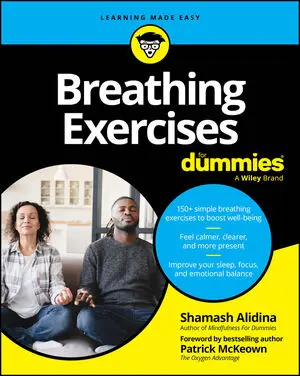This builtin is not currently supported: Animation
- Book & Article Categories

- Collections

- Custom Solutions
 Main Menu
Main MenuBook & Article Categories
 Main Menu
Main MenuBook & Article Categories
Shamash Alidina
Shamash Alidina is a professional mindfulness trainer, teacher, and lecturer. He has over 10 years' experience teaching mindfulness in schools and university courses.
Articles & Books From Shamash Alidina
Take control of your breath, take control of your life. Breathing Exercises For Dummies teaches you more than 50 ways to reduce stress, practice mindfulness, improve your sleep and beyond. Breathing exercises help you feel and perform at your best. These strategies have been in use since ancient times, and modern research shows how effective they can be.
Cheat Sheet / Updated 11-04-2025
Think of your breath like a loyal companion — always by your side, ready to energize or calm you. All it needs is a little attention. In this cheat sheet, you’ll discover how targeted breathing techniques can help you relieve stress, improve sleep, boost everyday wellness, manage panic, enhance physical performance, and anchor mindful moments.
Article / Updated 10-09-2025
Your breath is like your body's built-in Swiss Army knife—simple, always available, yet incredibly powerful. Most of us take around 20,000 breaths per day without giving it a second thought, but what if those breaths could do so much more than just keep you alive?Breathing exercises aren't just trendy wellness practices; they're scientifically-backed tools that can transform multiple aspects of your health and happiness.
Article / Updated 06-06-2023
The digital age has brought huge benefits: from saving lives in emergencies, to sharing information with the world, the advantages are countless. But without mindfulness, living in the digital age can drive you crazy! If you don’t turn your phone or computer off from time to time, your attention can be completely hijacked by websites, incoming messages, social media, games and more.
Article / Updated 12-29-2021
Mindfulness is simple in essence — it’s about cultivating present-moment awareness more than anything else — but the difficulty is in practicing mindfulness consistently. This article gives you a series of short, easy ways of integrating the principles of mindfulness into your everyday life. ©Shutterstock/Patrick FotoDon’t underestimate their value – they may take relatively little time and seem overly simplistic, but many of these tips have been proven to be effective.
Cheat Sheet / Updated 12-13-2021
Whether you’re suffering from stress, fatigue, or illness or simply want to regain some balance in your life, mindfulness can help. These bite-sized chunks of hands-on advice will help increase your understanding of mindfulness, outline some short meditations, and provide enough information to enable you to inject mindfulness into your life.
Article / Updated 06-27-2021
Acceptance turns out to be one of the most helpful attitudes to bring to mindfulness. Acceptance means perceiving your experience and simply acknowledging it rather than judging it as good or bad. For some people, the word "acceptance" is off-putting — replace it with the word acknowledgement, if you prefer.
For example, when you feel pain, whether it’s physical, such as a painful shoulder, or mental, such as depression or anxiety, the natural reaction is to try to avoid feeling the pain.
Article / Updated 01-24-2021
Mindfulness is a practice that encourages you to modify your perspective and focus on positive thinking. In doing so, you gain the ability to focus on self improvement, but in doing so, to be of greater service to those around you.Have you ever heard the safety announcements on a plane? In the event of an emergency, cabin crew advise you to put your own oxygen mask on first, before you help put one on anyone else, even your own child.
Article / Updated 02-25-2020
An addiction is a seemingly uncontrollable need to abuse a substance like drink or drugs or to carry out an activity like gambling. Addictions interfere with your life at home, work or school, where they cause problems. Finding successful treatment for addiction can be difficult and a constant battle, but mindfulness can help overcome the substance abuse struggle.
Article / Updated 02-25-2020
Positive psychology is the scientific study of strengths that enable individuals and communities to thrive. The field is based on the belief that people want to lead meaningful lives, cultivate what is best from within themselves and to enhance their experience of work, love and play.Mindfulness is one of the powerful tools in the positive psychology toolkit, because evidence demonstrates a link between mindfulness practice and levels of deeper wellbeing.




